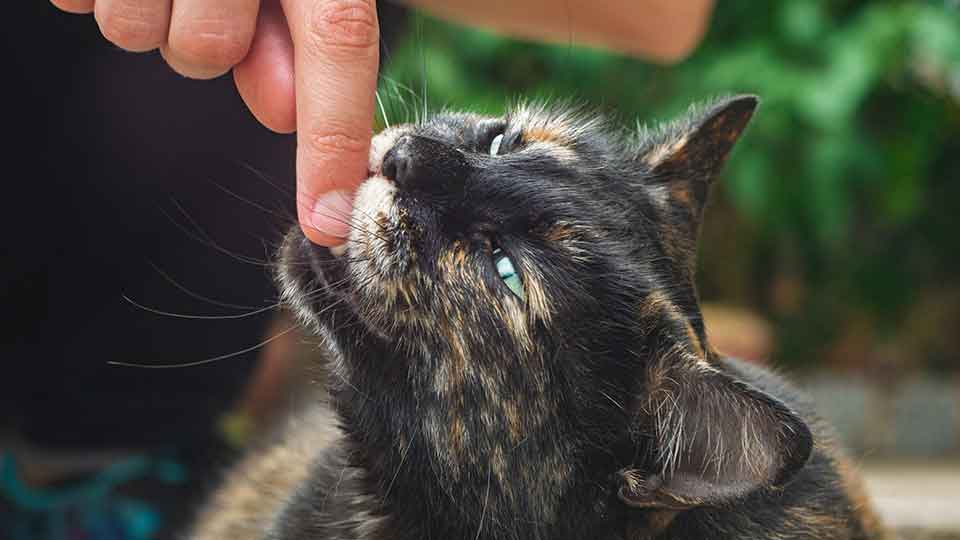It all started with my cat. Between the purr-filled cuddles and playful pounces, one thing had me baffled and a bit hurt – literally.
He’d bite me.
It wasn’t always, and it wasn’t an aggressive act, but it was frequent enough for me to wonder: why does my cat bite me?
Cat bites can range from gentle nibbles to painful punctures, and they can have different meanings depending on the context and the cat’s personality.
Let’s delve into this prickly subject and try to unravel why our feline friends might choose to bite the hand that pets them.
In this post, I will explore some of the common reasons why cats bite, how to tell if your cat is about to bite, what to do when your cat bites, and how to prevent or reduce biting behavior in your cat.
Why Does My Cat Bite Me?
Cats bite for a variety of reasons, but they usually don’t do it to hurt you.
Biting is a natural and normal behavior for cats to communicate different messages.
For adult cats, here are some of the common reasons why cats bite:
• Fear or anxiety. Cats may bite if they feel threatened or scared by something or someone. This is a way of defending themselves or warning others to back off. For example, your cat may bite you if you try to pick them up when they don’t want to be touched, or if they hear a loud noise that startles them.
• Play. Cats are predators, using their teeth and claws to hunt, catch and kill their prey. They may treat you like prey and bite you as part of their instinctive behavior when they play with you. For more playful cat breeds like Maine Coon, it is how they practice their hunting skills and have fun.
• Communication. Cats may bite to express a need, a desire, or an emotion. For example, your cat may bite you to get your attention, to ask for food, to show affection, or to tell you that they’ve had enough of something.
• Over-stimulation. Cats may bite if they feel overwhelmed or irritated by too much or too long petting, especially in sensitive areas like the belly, tail, or back. Your cat may also bite you to communicate that they want you to stop what you’re doing and give them some space.
• Miscommunication. Cats may bite if they misunderstand your intentions or signals. For example, your cat may bite you if you move your hand too fast or close to their face, thinking you are trying to play with or challenge them.
• Pain or illness. Cats may bite if they suffer from a medical condition or injury that causes pain or discomfort. This may be their way of telling you something is wrong or asking for help.
• Old age. Cats may bite if they are experiencing cognitive decline or dementia due to old age. This may affect their memory, perception, and behavior, making them more confused, anxious, or aggressive.
Kittens might bite you because they are growing teeth.
Teething is a normal process that all kittens go through, usually between three and six months of age.
A study found that teething kittens had higher levels of salivary cortisol, a hormone that indicates stress, than those who were not teething.
During this time, their baby teeth fall out and their adult teeth come in.
This can cause discomfort and make them want to chew on things to relieve the pain.
Some signs that indicate your kitten may be teething include:
- Vocalizing more, from small to loud meows
- Increased chewing, especially on soft items
- Drooling
- Bleeding gums
- Chewing food more slowly
- Eating less
- Crankiness
- Hesitant to bite at or shake toys
However, biting is not only caused by teething.
Kittens may also bite because they are exploring their world, playing, communicating, or feeling stressed or anxious for other reasons.
Therefore, it is crucial to understand your kitten’s personality, preferences, and triggers, and provide them with appropriate toys, activities, and care to prevent or reduce biting behavior.
Why Does My Cat Bite Me When Being Petted?
One of the most confusing situations for cat owners is when their cat bites them during a petting session.
You may think your cat is enjoying your affection, but they suddenly turn around and bite your hand.
This type of biting is often called petting-induced aggression or overstimulation.
It happens when your cat feels overwhelmed or irritated by too much or too long petting, especially in sensitive areas like the belly, tail, or back.
Your cat may also bite you to communicate that they have had enough and want you to stop.
Some signs that your cat is getting overstimulated are:
- Their ears flatten or rotate sideways or backward.
- Their pupils dilate and their eyes widen.
- Their tail starts to twitch or flick rapidly.
- Their skin twitches or ripples along their back.
- They start to lick, chew, or groom themselves excessively.
- They growl, hiss, or meow loudly.
If you notice any of these signs, it’s best to stop petting your cat and give them some space.
Don’t force them to continue the interaction, as this may make them more aggressive or fearful.
Respect their boundaries and let them decide when they want to be petted again.
Why Does My Cat Bite Me When Playing?
Another common reason why cats bite is when they are playing.
Cats are natural predators using their teeth and claws for hunting, catching, and killing their prey.
They may treat you like prey and bite you as part of their instinctive behavior when they play with you.
Playing is an important way for cats to exercise, stimulate their minds, and bond with you.
However, you don’t want your cat to think that biting you is acceptable or fun.
To prevent this, you should always use toys instead of your hands, feet, or other body parts when playing with your cat.
This way, your cat can safely express their predatory instincts without hurting you.
Some tips for choosing and using toys for your cat are:
• Choose toys that mimic the movement and appearance of prey animals, such as mice, birds, or insects. You can use toys that squeak, chirp, flutter, or vibrate to attract your cat’s attention.
• Move the toys in unpredictable ways that simulate how prey would behave. For example, you can drag a toy along the floor, toss it in the air, hide it behind furniture, or make it dart in and out of sight.
• Let your cat catch and “kill” the toy occasionally to satisfy their hunting drive. Praise them and reward them with a treat when they do so.
• Rotate the toys regularly to keep your cat interested and avoid boredom.
• Avoid using toys that are too small or have parts that can be easily swallowed or choked on by your cat.
• Store the toys away when not in use to prevent your cat from getting bored or destroying them.
Why Does My Cat Bite Me When I’m Not Doing Anything?
Sometimes, your cat may bite you seemingly out of the blue when you do nothing to provoke them.
This may happen for various reasons, such as:
• Your cat is bored or wants attention. Cats need mental and physical stimulation to stay happy and healthy. If they don’t get enough of it, they may bite you to get you to play with them or pay attention to them.
• Your cat is stressed or anxious. Cats are sensitive creatures that can be affected by changes in their environment or routine, such as moving to a new home, introducing a new pet or person, or hearing loud noises. These can cause them to feel insecure or threatened, and they may bite you to cope or express their emotions.
• Your cat is in pain or discomfort. Cats are good at hiding their pain, but sometimes they may bite you if they suffer from a medical condition or injury that causes pain or discomfort. This may be their way of telling you something is wrong or asking for help.
• Your cat is territorial or possessive. Cats are very territorial animals that like to mark their territory and protect it from intruders. They may also become possessive of certain objects or people that they consider theirs. If they feel that their territory or possession is being threatened or invaded, they may bite you to warn you or drive you away.
If your cat bites you when you are not doing anything, you should try to figure out the underlying cause and address it accordingly. For example, you can:
• Provide your cat with more toys, activities, and enrichment to keep them entertained and stimulated. You can also spend more time playing with them and giving them positive attention.
• Reduce your cat’s stress or anxiety by providing them with a safe and comfortable environment. You can also use calming products like pheromones, diffusers, CBD or sprays to help your cat relax and feel more secure.
• Take your cat to the vet for a check-up to rule out any medical issues that may be causing them pain or discomfort. Follow the vet’s advice on how to treat or manage your cat’s condition.
• Respect your cat’s territory and possessions and don’t force them to share or give them up. To prevent competition or conflict, you can also provide your cat with more resources, such as food bowls, water bowls, litter boxes, scratching posts, and beds.
Aggressive Cat Biting
Sometimes, your cat may bite you more aggressively, which can cause serious injury or infection.
This type of biting is usually associated with fear, defensiveness, or territoriality.
We have another post regarding Maine Coon’s temperament that explains why Maine Coon acts so aggressively.
Your cat may bite you if they feel threatened or attacked by you or another animal or person.
Some signs that your cat is feeling aggressive are:
• Their ears are flattened back against their head.
• Their eyes are narrowed and their pupils are dilated.
• Their whiskers are pulled back and their mouth is open.
• Their fur is puffed up and their body is arched.
• Their tail is stiff and straight or bushy and flicking.
• They are growling, hissing, spitting, or yowling.
If you encounter an aggressive cat, you should:
• Stay calm and don’t panic. Don’t make any sudden movements or loud noises that may provoke the cat further.
• Avoid eye contact with the cat. Looking directly at the cat may be seen as a challenge or a threat to the cat.
• Give the cat some space and time to calm down. Don’t try to approach, touch, or pick up the cat when they are in this state. Back away slowly and quietly until you are out of the cat’s sight or reach.
• Seek medical attention if an aggressive cat bites you. Cat bites can be deep and prone to infection. Wash the wound thoroughly with soap and water and apply pressure to stop the bleeding. See a doctor as soon as possible for treatment and advice, especially if you don’t know if the cat is vaccinated.
Unvaccinated cats may carry the rabies virus, which is virtually 100% fatal. So do treat the biting seriously under this circumstance!
How Will I Know If My Cat Is About to Bite Me?
As mentioned earlier, cats usually give some signals before they bite, such as body language, vocalization, or grooming behavior.
However, some cats may be more subtle or unpredictable in their biting behavior, making it harder for you to anticipate or prevent it.
To know if your cat is about to bite you, you must pay attention to their mood, personality, and preferences.
It would be best to learn what triggers your cat’s biting behavior and what signs they show before they bite.
You also need to observe how your cat reacts to different petting, playing, or interaction types.
Some tips for understanding your cat’s biting behavior are:
• Watch your cat’s eyes. Cats use their eyes to communicate a lot of information. If your cat’s eyes are wide open and their pupils are dilated, they may be excited, scared, or angry. If your cat’s eyes are half-closed or blinking slowly, they may be relaxed, content, or affectionate.
• Listen to your cat’s voice. Cats use different sounds to express different emotions. If your cat is purring, they may be happy or comfortable. If your cat is meowing softly, they may greet you or ask for something. Your cat may be angry or afraid if they growling, hissing, or yowling loudly.
• Feel your cat’s body. Cats use their body to convey their mood and intention. If your cat is relaxed and loose, they may enjoy your touch. If your cat is tense and stiff, they may be uncomfortable or annoyed. If your cat is arched and puffed up, they may be scared or aggressive.
What Should I Do When My Cat Bites Me?
If your cat bites you, you should react in a way that discourages them from doing it again without hurting them or damaging your relationship with them.
Some things you can do when your cat bites you are:
• Say “ouch” or “no” loudly and firmly. This will let your cat know that biting hurts you and you don’t like it.
• Stop the interaction immediately. Withdraw your hand or body parts from the cat’s mouth and stop petting or playing with them. This will teach your cat that biting ends the fun and attention.
• Ignore your cat for a few minutes. Turn your back on them or walk away from them. This will show your cat that biting results in losing your attention and company.
• Reward your cat for good behavior. When your cat stops biting or behaves nicely, praise them and give them a treat or a toy. This will reinforce their positive behavior and make them more likely to repeat it.
How to Stop My Cat From Biting You?
Biting is a natural and normal behavior for cats, but it can be unpleasant and harmful for you and your cat.
Therefore, try to prevent or reduce your cat’s biting behavior as much as possible. Some ways to do this are:
• Spay or neuter your cat. This will reduce their hormonal aggression and make them more calm and friendly.
• Socialize your cat from an early age. Expose your cat to different people, animals, and situations when they are young and teach them how to interact with them appropriately. This will make your cat more confident and less fearful or aggressive.
• Provide your cat with enough stimulation and exercise. Give your cat plenty of toys, activities, and enrichment to keep them busy and happy. Play with your cat regularly and let them healthily release their energy and aggression.
• Avoid triggering your cat’s biting behavior. Learn what makes your cat bite and avoid doing it or minimize it. For example, if your cat bites when being petted, limit the duration and intensity or avoid the areas they don’t like. If your cat bites when playing, use toys instead of your hands or feet or stop the play when they get too rough.
• Teach your cat bite inhibition. Bite inhibition is the ability to control the force and frequency of biting. You can teach your cat bite inhibition by yelping or saying “ouch” when they bite you too hard and stopping the interaction. This will make your cat realize that biting hurts you and that they should be more gentle.
My Final Thoughts
Biting is a common behavior for cats with different meanings and causes. Figure out what provokes their biting and deal with the triggers according.
In most cases, it is not a serious problem, and your cat definitely does not bite to hurt you.
But see a doctor as soon as possible if you are badly bitten or bitten by a strange cat.







